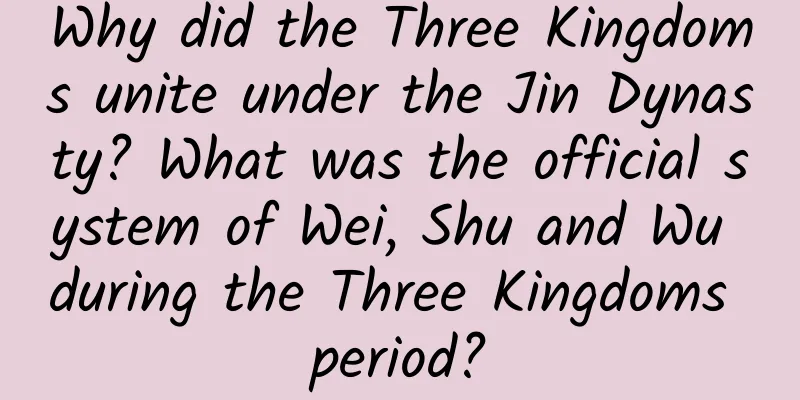Why did the Three Kingdoms unite under the Jin Dynasty? What was the official system of Wei, Shu and Wu during the Three Kingdoms period?

|
The Romance of the Three Kingdoms can be roughly divided into five parts: the Yellow Turban Rebellion, the Rebellion of Dong Zhuo, the Warring States, the Three Kingdoms, and the Return of the Three Kingdoms to the Jin Dynasty. It describes the historical events of nearly a hundred years from the end of the Eastern Han Dynasty to the beginning of the Western Jin Dynasty. It mainly describes wars, telling the story of the warring wars among the heroes in the late Eastern Han Dynasty and the political and military struggles between the Three Kingdoms of Wei, Shu, and Wu. In the end, Sima Yan unified the Three Kingdoms and established the Jin Dynasty. It reflects the transformation of various social struggles and contradictions in the Three Kingdoms era, summarizes the great historical changes of this era, and shapes a group of powerful heroes of the Three Kingdoms. So, why did the Three Kingdoms unify in Jin? What was the official system of Wei, Shu, and Wu in the Three Kingdoms? Let's take a look at the introduction of Encyclopedia Knowledge Network for these questions! Contents of this article 1. Why did the Three Kingdoms unify in the Jin Dynasty? 2. What was the official system of Wei, Shu and Wu during the Three Kingdoms period? 3. What was the official position of Duyou during the Three Kingdoms period? 1Why did the Three Kingdoms unify into Jin?In terms of military strength and talent, neither Shu nor Wu could compete with Wei, and Wei was later replaced by Jin. The only way for them to protect themselves was to unite. In the early days of the Three Kingdoms, Shu and Wu did the same. Later, due to the uneven distribution of interests, Shu and Wu had conflicts and their national strength declined further. But at this time, Shu and Wu still had the possibility of uniting in the face of Wei's attack. At the end of the Three Kingdoms, Shu and Wu had a talent gap. The monarchs of the two countries were not ambitious enough and had limited abilities. It was reasonable that the two countries were destroyed by Wei. Wei was replaced by Jin because the Sima family gradually gained control of the military power and held great power during the war. After gaining control of the military power, they gradually became disloyal to the mediocrity of the monarch of Wei. After slaughtering all the loyal ministers loyal to the Cao family, it was natural for them to take the throne. There have always been stories of holding troops and being self-respecting and making great achievements shocking the lord in ancient Chinese history. So the Three Kingdoms were finally unified in Jin. 2What was the official system like during the Three Kingdoms period?The main official positions of Wei, Shu and Wu during the Three Kingdoms period were: 1. Prime Minister, also known as Xiangguo, did not exist in the Eastern Han Dynasty. Later, Dong Zhuo became a monopoly of power and became the prime minister, concentrating all power in one person. After the establishment of the Three Kingdoms, this position was established, and the prime minister was the chief minister of a country and the head of all ministers. 2. Tai Shi was originally one of the "Three Orphans". This position was not set up in the Eastern Han Dynasty. After Dong Zhuo moved the capital to Chang'an, he was appointed Tai Shi, also known as Shang Fu, and ranked above Tai Fu. 3. Taifu, originally one of the "Three Orphans", was only the position of Taifu in the Eastern Han Dynasty, and it was not always appointed. When the emperor first ascended the throne, an important official who guided and assisted the emperor was ranked above the Three Dukes. 4. Taiwei: In the Eastern Han Dynasty, the power of the prime minister was divided equally among the three dukes. Taiwei was the head of the three dukes and was in charge of military affairs. His subordinates included Changshi, Dongcao, Xicao and Hucao. 5. Situ, one of the Three Dukes, was in charge of civil affairs, which was similar to the scope of power of the later prime minister. After Cao Pi became emperor, he changed the prime minister of Wei to Situ. 6. The Imperial Censor, one of the Three Dukes, was in charge of supervision and law enforcement. Later, the Minister of Works was made one of the Three Dukes, and the position of the Imperial Censor was abolished. When the State of Wei was established, Hua Xin was made the Imperial Censor, and this position was restored. 3What was the official position of Duyou during the Three Kingdoms period?Duyou is the abbreviation of Duyou Shuyuan and Duyou Caoyuan, which was first established in the middle of the Western Han Dynasty. During the Han Dynasty, the position was of little importance but had great power. He was responsible for conveying orders, supervising subordinates, examining criminal cases, and checking illegalities. If a county was divided into a department, all departments would have a post, such as the Western Supervisory Office and the Eastern Supervisory Office. Since the Wei and Jin dynasties of the Three Kingdoms period, the post was not as important as that of the previous dynasties. Later, the post was gradually reduced. In the Northern Qi Dynasty, it was only set up in Qingdu County. In the early Sui Dynasty, the county was abolished, and the Supervisory Office was also abolished. |
Recommend
When can I exercise after miscarriage?
Having a baby is the wish of every family, and it...
What to do if frozen chicken wings have a fishy smell? How to remove the fishy smell of frozen chicken wings
We all know that chicken wings are a popular deli...
Health Tips | Is a cold most contagious when you are almost recovering?
A cold usually refers to a disease caused by path...
Can I eat fatty and lean pork during menstruation?
Menstruation refers to the menstrual period of wo...
The harm of eating spicy hot pot to women
Chuan Chuan Xiang is one of the foods that people...
Symptoms of poor kidney function in girls
If a person has some problems with excretion, our...
Fruit cucumbers, fruit corn, fruit peppers...what is so unique about fruit vegetables?
Nowadays, it is popular to add the word "fru...
Pictures of hymen
The breaking of the hymen has been like a copy fr...
Is it good to lose weight during menstruation?
Menstruation is the first step for a girl to grow...
International Pharmaceutical News丨Oral inactivated vaccine for urinary tract infection? It’s true, but…
The vaccine to prevent " urinary tract infec...
How to eliminate edema during menstruation
Menstruation is a very special physiological phen...
What to do if your blood pressure is high during late pregnancy
We live in a society where the economy, science a...
Taking folic acid can delay menstruation by 15 days
Folic acid tablets are also a nutrient that every...









